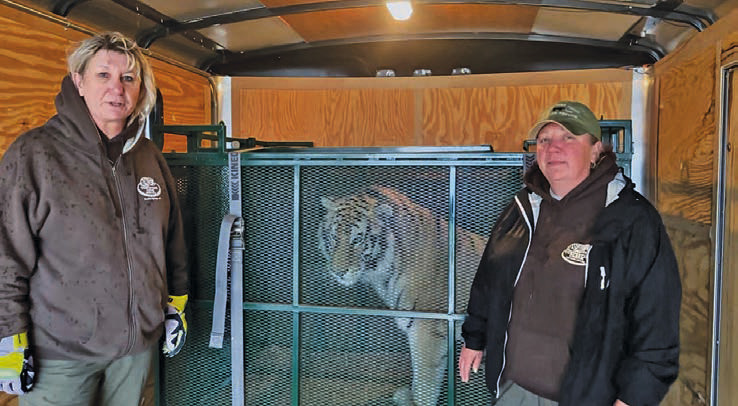In a critical rescue effort, seven tigers have been removed from unsafe conditions and relocated to Turpentine Creek Wildlife Refuge in Eureka Springs, where they will receive lifelong care in a secure and natural environment.
The tigers were relocated to TCWR, one of 10 fully accredited big cat sanctuaries under the Global Federation of Animal Sanctuaries in North America. TCWR has a proven track record of providing lifelong care for abused and neglected big cats, offering them spacious natural habitats, expert veterinary attention and a chance to heal from years of mistreatment with specialized care and enrichment.
The newly arrived tigers will now be part of TCWR’s Witness Protection Program, which safeguards rescued animals by keeping their locations confidential when necessary for their safety.
“Providing these tigers with a safe, species- appropriate home is our top priority,” said Tanya Smith, president of Turpentine Creek Wildlife Refuge. “Our team is committed to ensuring they receive the best possible care and a peaceful, stable environment for the rest of their lives.”
In a news release, TCWR said: “This seizure underscores the commitment of local authorities and animal welfare organizations to uphold animal welfare laws and ensure the safety of both the public and the animals involved. In addition, this case highlights the ongoing need for stricter enforcement of federal, state, and county wildlife laws and underscores the critical role that sanctuaries like TCWR play in ensuring rescued big cats have a safe, ethical future.”
Turpentine Creek Wildlife Refuge president Tanya Smith (left) and animal curator Emily McCormack with one of seven tigers that were recently rescued from Nevada and relocated to Turpentine Creek. The refuge’s rescue team traveled more than 2,800 miles to retrieve the tigers, arriving back at Turpentine Creek on Friday morning, April 4.
The animals will remain in Turpentine Creek Wildlife Refuge Witness Protection and Rescue Program, where the focus will be only on their animal welfare and veterinary care.
The TCWR rescue team traveled more than 2,800 miles to retrieve the seven tigers, returning to the refuge at about 9 a.m. Friday, April 4. The team had departed Pahrump, Nev., late on the afternoon of Wednesday, April 2, and encountered snow that evening. Despite the elements, the group pressed on and arrived at TCWR just as thunderstorms rolled through the area.
The tigers traveled well. Trailers containing the cats were carefully staged near their new den areas while the team waited for a break in the weather to begin unloading.
Unloading big cats is a methodical process: Each transport crate is securely attached to the den area of their habitat, and the cat is given the choice to step out when ready. Meat may be offered as an enticement, but there is no pressure — their comfort and safety come first. With seven cats to transition and storms active in the area, the process took time, but by 6:15 p.m. Friday evening, all seven tigers were successfully and peacefully transitioned into their den spaces.
The cats will remain in the den areas temporarily as TCWR’s expert animal care team conducts initial health assessments and bloodwork analysis in the coming days.
This rescue was made possible thanks to collaboration across multiple organizations and authorities. In a statement, the Big Cat Sanctuary Alliance said authorities in Nye County, Nevada, contacted the Wildlife Confiscations Network and the U.S. Fish and Wildlife Service to find placement for the Tigers. Those groups, in turn, contacted the BCSA to find a suitable sanctuary for the tigers.
“Nye County asked for BCSA to recommend a sanctuary that could be onsite for the seizure to immobilize and transport up to 12 big cats at once, and to keep them all together during the pending case,” the BCSA statement said. “Given all the parameters set forth by Nye County, the BCSA recommended Turpentine Creek, since they have experience in cases like this but most importantly, had open permanent habitats for all the cats to immediately be released into. We are incredibly proud of Turpentine Creek for stepping up and helping when needed. I am also very proud that the BCSA is being recognized by authorities throughout the country as a leader in the exotic rescue world. That recognition is not only important in being the go-to organization for rescues but gives us credibility when working on legislation for the protection of wild cats.”
If you would like to support the tigers’ care, please visit https://turpentinecreek. app.neoncrm. com/forms/witness- protection.
For more information, visit www.turpentinecreek. org or call 479-253-5841.


